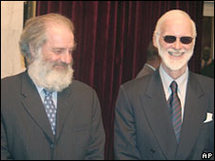
Ould Sheik was hailed for his successful efforts to free 14 European hostages in 2003, and has since been considered the go-to person for such politically delicate negotiations.
But he told The Globe and Mail that Ottawa never thanked him for his three months of work to free then-UN special envoy to Niger Robert Fowler and his colleague Louis Guay, and was never compensated for his considerable expenses.
The pair, kidnapped by armed militants west of Niamey in December 2008, and two European tourists were released after 130 days in captivity thanks to Ould Sheik's intervention.
The Toronto-based daily reported that Ould Sheik went at time through great pains to contact the militants, who never kept the same satellite phone number for more than a couple of days.
He sometimes had to drive for days through the desert, then wait at a designated location for three or four days until someone came to him with a phone number to call.
Ould Sheikh also at times had to drive almost as far as the Algerian border, some 700 kilometers (435 miles) through the Sahara desert from his base in the northern town of Gao, and said the terrorists who held the Canadians captive made tough negotiation partners.
"Sometimes I had to explain to them that what they wanted was not possible," he said. "Sometimes I had to beg them to accept what we were offering."
A delegation of eight dignitaries from Ould Sheik's region in Mali played a role in the hostage talks, and the lack of remuneration has led to strife among the group, with some mistakenly accusing the negotiator of withholding payments from Canada for himself.
"The Canadians said that since I had used many people in the negotiations, and many vehicles, there would be a gesture for everyone. But it never came, and this caused a conflict among us," said Ould Sheikh.
"Everyone understood that Mali is poor, but we thought that Canada would help us."
--------------------------------------------------------------------------------------------------------------------------------
But he told The Globe and Mail that Ottawa never thanked him for his three months of work to free then-UN special envoy to Niger Robert Fowler and his colleague Louis Guay, and was never compensated for his considerable expenses.
The pair, kidnapped by armed militants west of Niamey in December 2008, and two European tourists were released after 130 days in captivity thanks to Ould Sheik's intervention.
The Toronto-based daily reported that Ould Sheik went at time through great pains to contact the militants, who never kept the same satellite phone number for more than a couple of days.
He sometimes had to drive for days through the desert, then wait at a designated location for three or four days until someone came to him with a phone number to call.
Ould Sheikh also at times had to drive almost as far as the Algerian border, some 700 kilometers (435 miles) through the Sahara desert from his base in the northern town of Gao, and said the terrorists who held the Canadians captive made tough negotiation partners.
"Sometimes I had to explain to them that what they wanted was not possible," he said. "Sometimes I had to beg them to accept what we were offering."
A delegation of eight dignitaries from Ould Sheik's region in Mali played a role in the hostage talks, and the lack of remuneration has led to strife among the group, with some mistakenly accusing the negotiator of withholding payments from Canada for himself.
"The Canadians said that since I had used many people in the negotiations, and many vehicles, there would be a gesture for everyone. But it never came, and this caused a conflict among us," said Ould Sheikh.
"Everyone understood that Mali is poor, but we thought that Canada would help us."
--------------------------------------------------------------------------------------------------------------------------------









 Home
Home Politics
Politics









